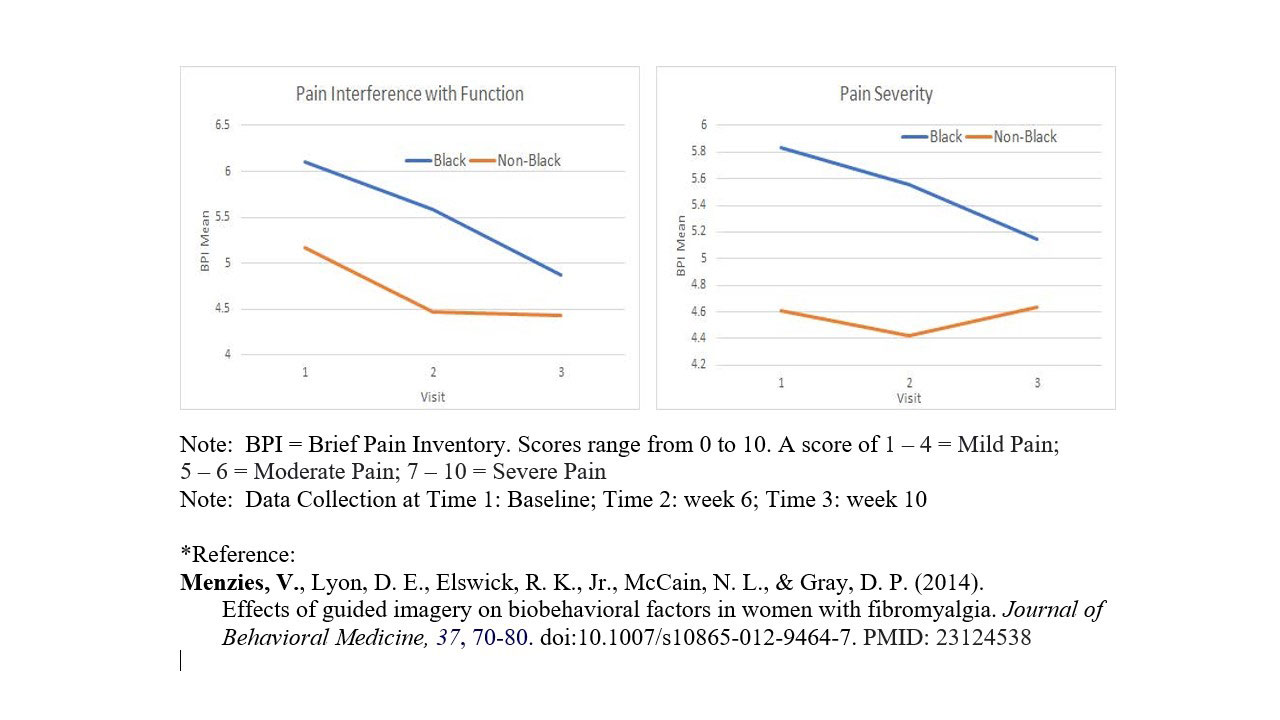Session Information
Session Type: Poster Session B
Session Time: 9:00AM-10:30AM
Background/Purpose: Fibromyalgia syndrome (FMS) is a condition characterized by diffuse, widespread, persistent musculoskeletal pain in multiple regions of the body. While FMS is more prevalent among White women than other racial groups, little is known about variation in FMS experience and symptomology between population cohorts. This secondary data analysis examines self-reported pain in a racially diverse cohort of women with FMS over the course of 10 weeks assessing their responses to a guided imagery intervention.
Methods: As reported in the parent study (Menzies et al., 2014), the Brief Pain Inventory (BPI) was administered to 70 women (21 Black and 50 White) at baseline, after 6 weeks, and after 10 weeks. The BPI includes 2 dimensions: pain severity and pain interference with functions. Two-sample t-tests and mixed effects, time series regression models were used to examine racial difference in pain severity, interference, and treatment response. Regression models included indicators for age, race, income, duration of symptoms, treatment group, pain reported at baseline, smoking, alcohol use, comorbid conditions, and time. Treatment response was tested using race/treatment and race/time interactions.
Results: On average, Black women experienced significantly higher pain severity (5.52, sd=2.13) and pain interference (5.54, sd=2.74) than White women (severity 4.56, sd=2.08; interference 4.72, sd=2.76) (interference: t=1.92, p= 0.05; severity: t=2.95, p=0.00). Disparities persisted at all three observation points. Regression models indicated that even after controlling for differences in age, income, and previous pain levels, Black women had on average 0.26 (SE=0.065) higher pain severity and 0.36 (SE=0.078) higher pain interference than Whites. Low-income earners also experienced 2.02 (SE=0.38) and 2.19 (SE=0.46) higher pain severity and interference, respectively, than other earners. Results were robust to inclusion of behavioral and comorbidity controls.
Conclusion: Black women and low-income earners experienced significantly higher levels of pain severity and interference throughout the study duration and had a lower dose response to the intervention. Differentials were robust to inclusion of demographic, health, and behavioral characteristics. These findings suggest that external or contextual factors could play a role in individual pain perception among women with FMS.
To cite this abstract in AMA style:
Menzies V, Jacobs M. Racial Disparities in Pain: Severity, Interference with Function, and Response to Guided Imagery [abstract]. Arthritis Rheumatol. 2022; 74 (suppl 9). https://acrabstracts.org/abstract/racial-disparities-in-pain-severity-interference-with-function-and-response-to-guided-imagery/. Accessed .« Back to ACR Convergence 2022
ACR Meeting Abstracts - https://acrabstracts.org/abstract/racial-disparities-in-pain-severity-interference-with-function-and-response-to-guided-imagery/

